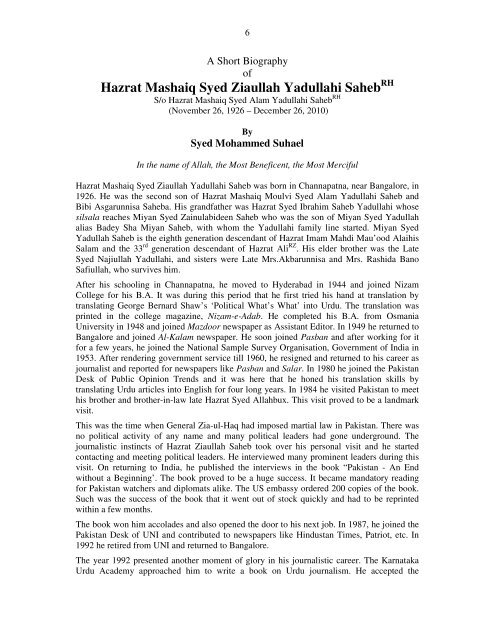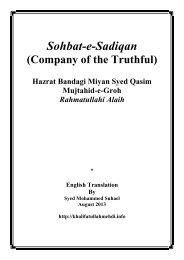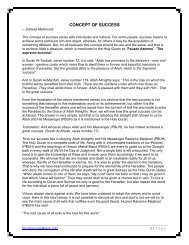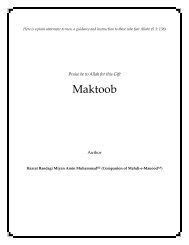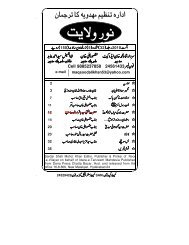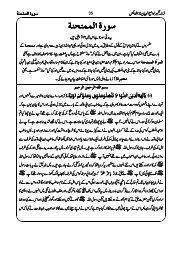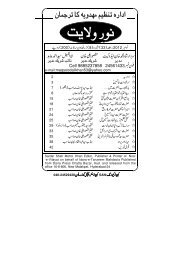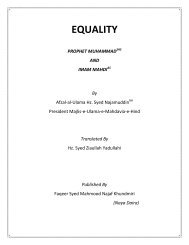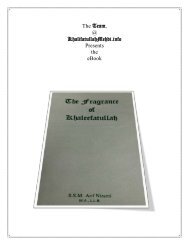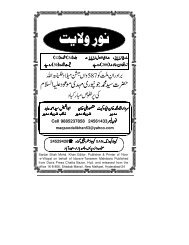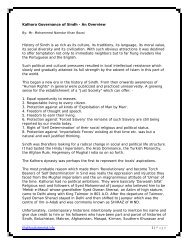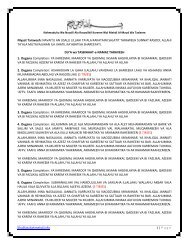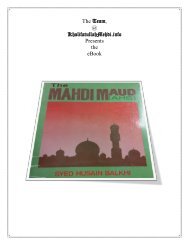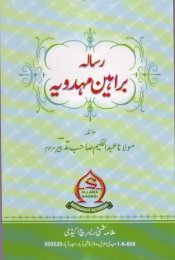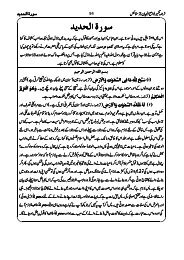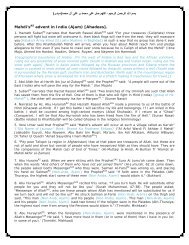Siraj-ul-Absar (English) - Khalifatullah Mehdi (AHS)
Siraj-ul-Absar (English) - Khalifatullah Mehdi (AHS)
Siraj-ul-Absar (English) - Khalifatullah Mehdi (AHS)
You also want an ePaper? Increase the reach of your titles
YUMPU automatically turns print PDFs into web optimized ePapers that Google loves.
6<br />
A Short Biography<br />
of<br />
Hazrat Mashaiq Syed Zia<strong>ul</strong>lah Yad<strong>ul</strong>lahi Saheb RH<br />
S/o Hazrat Mashaiq Syed Alam Yad<strong>ul</strong>lahi Saheb RH<br />
(November 26, 1926 – December 26, 2010)<br />
By<br />
Syed Mohammed Suhael<br />
In the name of Allah, the Most Beneficent, the Most Mercif<strong>ul</strong><br />
Hazrat Mashaiq Syed Zia<strong>ul</strong>lah Yad<strong>ul</strong>lahi Saheb was born in Channapatna, near Bangalore, in<br />
1926. He was the second son of Hazrat Mashaiq Mo<strong>ul</strong>vi Syed Alam Yad<strong>ul</strong>lahi Saheb and<br />
Bibi Asgarunnisa Saheba. His grandfather was Hazrat Syed Ibrahim Saheb Yad<strong>ul</strong>lahi whose<br />
silsala reaches Miyan Syed Zain<strong>ul</strong>abideen Saheb who was the son of Miyan Syed Yad<strong>ul</strong>lah<br />
alias Badey Sha Miyan Saheb, with whom the Yad<strong>ul</strong>lahi family line started. Miyan Syed<br />
Yad<strong>ul</strong>lah Saheb is the eighth generation descendant of Hazrat Imam Mahdi Mau’ood Alaihis<br />
Salam and the 33 rd generation descendant of Hazrat Ali RZ . His elder brother was the Late<br />
Syed Naji<strong>ul</strong>lah Yad<strong>ul</strong>lahi, and sisters were Late Mrs.Akbarunnisa and Mrs. Rashida Bano<br />
Safi<strong>ul</strong>lah, who survives him.<br />
After his schooling in Channapatna, he moved to Hyderabad in 1944 and joined Nizam<br />
College for his B.A. It was during this period that he first tried his hand at translation by<br />
translating George Bernard Shaw’s ‘Political What’s What’ into Urdu. The translation was<br />
printed in the college magazine, Nizam-e-Adab. He completed his B.A. from Osmania<br />
University in 1948 and joined Mazdoor newspaper as Assistant Editor. In 1949 he returned to<br />
Bangalore and joined Al-Kalam newspaper. He soon joined Pasban and after working for it<br />
for a few years, he joined the National Sample Survey Organisation, Government of India in<br />
1953. After rendering government service till 1960, he resigned and returned to his career as<br />
journalist and reported for newspapers like Pasban and Salar. In 1980 he joined the Pakistan<br />
Desk of Public Opinion Trends and it was here that he honed his translation skills by<br />
translating Urdu articles into <strong>English</strong> for four long years. In 1984 he visited Pakistan to meet<br />
his brother and brother-in-law late Hazrat Syed Allahbux. This visit proved to be a landmark<br />
visit.<br />
This was the time when General Zia-<strong>ul</strong>-Haq had imposed martial law in Pakistan. There was<br />
no political activity of any name and many political leaders had gone underground. The<br />
journalistic instincts of Hazrat Zia<strong>ul</strong>lah Saheb took over his personal visit and he started<br />
contacting and meeting political leaders. He interviewed many prominent leaders during this<br />
visit. On returning to India, he published the interviews in the book “Pakistan - An End<br />
without a Beginning’. The book proved to be a huge success. It became mandatory reading<br />
for Pakistan watchers and diplomats alike. The US embassy ordered 200 copies of the book.<br />
Such was the success of the book that it went out of stock quickly and had to be reprinted<br />
within a few months.<br />
The book won him accolades and also opened the door to his next job. In 1987, he joined the<br />
Pakistan Desk of UNI and contributed to newspapers like Hindustan Times, Patriot, etc. In<br />
1992 he retired from UNI and returned to Bangalore.<br />
The year 1992 presented another moment of glory in his journalistic career. The Karnataka<br />
Urdu Academy approached him to write a book on Urdu journalism. He accepted the


